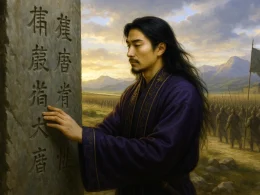All flames are put out all over the sky;
On the ground no smoke can be seen.
I wonder where a spark could come by
To light my heart, a traveler keen.
Original Poem
「寒食」
沈佺期
普天皆灭焰,匝地尽藏烟。
不知何处火,来就客心然。
Interpretation
This poem was written during Shen Quanqi's period of exile. The Cold Food Festival, occurring two days before the Qingming Festival, was a traditional occasion when people extinguished fires and ate cold food to commemorate Jie Zitui. It was also a time for family reunions, tomb sweeping, and remembrance. For an exiled poet, this festival instead evoked intense loneliness and homesickness. With extremely concise strokes, Shen Quanqi contrasts the external solitude of "extinguished flames" and "hidden smoke" with the internal fervor of a "burning heart," achieving a psychological shift from stillness to movement, from external to internal, in just four lines.
First Couplet: "普天皆灭焰,匝地尽藏烟。"
Pǔtiān jiē miè yàn, zā dì jìn cáng yān.
All under heaven extinguish their flames;
Every corner of the earth hides its smoke.
The opening depicts the unique scene of the Cold Food Festival: fires are forbidden, and the world is enveloped in quiet stillness. Shen Quanqi uses the terms "all under heaven" and "every corner of the earth" to present a panoramic view, immersing the poem from the outset in a solemn and cold atmosphere. While ostensibly describing the festival custom, it subtly conveys a mood of "cold heaven, silent earth, and a lonely human heart."
Second Couplet: "不知何处火,来就客心然。"
Bùzhī hé chù huǒ, lái jiù kè xīn rán.
I know not from where a fire comes,
To ignite this traveler's heart.
This couplet is the soul of the poem. "I know not from where a fire comes" describes an unexpectedly glimpsed external flame, rich in symbolic meaning. It is both a visual warmth and an emotional sustenance—a flame of longing. The phrase "ignite this traveler's heart" uses the character 然 (rán) with its double meaning: it signifies the kindling of a flame and symbolizes the stirring of emotion and the burning of thought, merging the external scene with internal feeling.
Holistic Appreciation
This poem appears to describe a festival custom but truly expresses the homesickness of a poet alone in a distant land. The first couplet uses extreme silence to create space: the vast imagery of "all under heaven" and "every corner of the earth" makes the reader feel the emptiness after the fires are extinguished. The final couplet suddenly turns inward, with the line "I know not from where a fire comes" breaking the silence, creating a strong visual and psychological contrast—a single spark in the solitude is like the exile's inner emotions suddenly ignited.
In this short poem, Shen Quanqi creates an emotional arc from "extinguished" to "kindled": the first two lines are cold, the last two warm; the external world is extinguished, the internal heart burns. This structure of "internal heat versus external cold" concentrates the emotion and leaves a lasting resonance, making it a rare short masterpiece beyond the early Tang regulated verse.
Artistic Merits
- Significance in Smallness, Emotion Through Imagery: Uses the Cold Food Festival's fire prohibition custom to convey the poet's loneliness and homesickness while traveling.
- Clear Contrast and Turn: The shift from "extinguished flames" and "hidden smoke" to "fire" and "heart kindled" creates an emotional contrast from cold to warm.
- Extremely Concise Language with Deep Imagery: Twenty characters in four lines, clearly layered, seamlessly blending scene and emotion.
- Open and Subtle Ending: The poem ends with "kindled," but the meaning lingers, symbolizing the never-extinguished longing and vitality in the heart.
- Smooth Rhythm and Lonely Atmosphere: The rhythm is short and concise, reflecting the mature shift in Shen Quanqi's mid-to-late style from courtly elaboration to introspection and calmness.
Insights
This work is a model of expressing profound emotion with very few words. It reveals that true loneliness lies not in a silent world but in that single "burning" thought within the heart. In exile, surrounded by a fireless world, Shen Quanqi sees a flame in the darkness—the flame of longing for homeland, persistence in life, and the pursuit of warmth. The poet uses "all under heaven extinguish their flames" to describe the deathly stillness of the environment and "the traveler's heart is kindled" to describe the burning spirit, creating a powerful contrast. This is not just a poem about the Cold Food Festival but a poem about the inextinguishable spirit—on life's long journey, only that inner flame has the power to illuminate loneliness.
About the Poet

Shen Quanqi (沈佺期 c. 656–715), courtesy name Yunqing, was a native of Neihuang in Henan Province and an important poet of the early Tang Dynasty. Along with Song Zhiwen, he was renowned as one of the "Shen-Song" duo, whose work played a decisive role in finalizing the form of the five-character regulated verse (wuyan lüshi) in Tang poetry. His poems often include courtly compositions and travel-themed reflections, characterized by refined elegance and structural rigor. Shen was particularly skilled in the seven-character regulated verse (qilü), and his writing marks a transition from the lingering style of the Six Dynasties to the flourishing era of High Tang poetry. His contributions hold milestone significance in the development of modern-style verse (jintishi).












